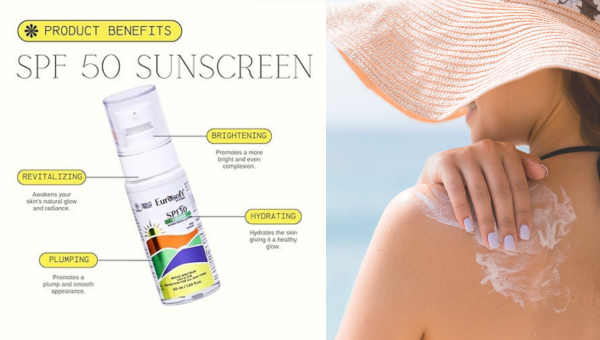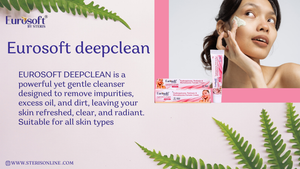Introduction
In today’s world, skincare has evolved to focus not just on hydration and nourishment but also on protection from environmental aggressors. One of the most critical steps in a daily skincare regimen is protecting the skin from the harmful effects of ultraviolet (UV) radiation. SPF 50 Sunscreen Lotion is an essential product that offers broad-spectrum protection, shielding the skin from both UVA and UVB rays.
Sun exposure is one of the primary causes of premature aging, skin damage, and conditions such as skin cancer. Using an SPF 50 sunscreen lotion regularly can dramatically reduce these risks while promoting healthy, glowing skin. This article will delve into the importance of sunscreen, the science behind SPF, and the benefits of incorporating an SPF 50 sunscreen lotion into your skincare routine.
What is SPF and Why is It Important?
SPF (Sun Protection Factor) is a measure of a sunscreen’s ability to protect the skin from harmful UVB rays, the rays responsible for sunburn. The higher the SPF, the greater the level of protection provided. For example, SPF 50 means that it will take 50 times longer for your skin to burn than if you weren’t wearing sunscreen at all.
While SPF focuses on UVB protection, it is important to note that broad-spectrum sunscreens protect against both UVA and UVB rays. UVA rays penetrate deeper into the skin, contributing to long-term skin damage, photoaging, and an increased risk of skin cancer, while UVB rays primarily cause sunburn.
Using a sunscreen lotion with an SPF of 50 provides robust protection from both types of UV radiation, which is essential for anyone spending prolonged periods outdoors.
Key Ingredients in SPF 50 Sunscreen Lotion
The efficacy of a sunscreen lotion largely depends on its active ingredients, which are responsible for absorbing, reflecting, or scattering harmful UV radiation. SPF 50 Sunscreen Lotion typically contains a combination of physical and chemical filters to provide comprehensive sun protection. Here are the key ingredients commonly found in SPF 50 formulations:
A. Zinc Oxide
Zinc oxide is a physical (or mineral) sunscreen agent known for its ability to reflect UV rays away from the skin. It provides broad-spectrum protection and is gentle on sensitive skin. Zinc oxide forms a protective barrier on the skin’s surface, which is especially beneficial for those with skin conditions like rosacea or eczema, as it is non-irritating.
B. Titanium Dioxide
Like zinc oxide, titanium dioxide is another physical sunscreen agent. It works by reflecting and scattering UV rays, particularly UVA rays, which are responsible for aging the skin. Titanium dioxide is also non-comedogenic, making it suitable for those with acne-prone skin.
C. Avobenzone
Avobenzone is a chemical sunscreen agent that provides protection against UVA rays. Unlike physical sunscreen agents, avobenzone works by absorbing UV rays, converting them into heat, and releasing them from the skin. It is one of the most commonly used chemical filters in sunscreens, providing broad-spectrum protection without leaving a white residue on the skin.
D. Octinoxate
Octinoxate is a UVB filter that helps prevent sunburn. It is commonly used in sunscreens to absorb UVB rays, ensuring the skin remains protected from the harmful effects of sun exposure. Octinoxate is known for its ability to enhance the stability of sunscreen formulations.
E. Glycerin
While not directly involved in sun protection, glycerin plays a crucial role in moisturizing the skin. Sunscreen can sometimes dry out the skin, but glycerin helps retain moisture, ensuring that the skin stays hydrated throughout the day.
F. Vitamin E (Tocopherol)
Vitamin E is a potent antioxidant that protects the skin from oxidative stress caused by UV exposure. It neutralizes free radicals, preventing premature skin aging and boosting the skin’s natural repair process. It also helps to soothe and nourish the skin, making it an essential addition to a sunscreen lotion.
Benefits of SPF 50 Sunscreen Lotion
A. Effective UV Protection
The primary benefit of using SPF 50 Sunscreen Lotion is its high level of protection against harmful UV rays. With SPF 50, your skin is shielded from 98% of UVB radiation, reducing the risk of sunburn and long-term damage. This makes SPF 50 sunscreen ideal for daily wear, especially for people with fair skin or those who are prone to sunburn.
B. Prevents Premature Aging
Sun exposure accelerates the aging process of the skin, leading to fine lines, wrinkles, and loss of skin elasticity. UV rays break down collagen and elastin in the skin, leading to premature signs of aging. By using SPF 50 Sunscreen Lotion, you can protect your skin from these harmful effects, helping to maintain a youthful and radiant complexion for longer.
C. Reduces the Risk of Skin Cancer
UV radiation is a significant risk factor for the development of skin cancer, including melanoma, basal cell carcinoma, and squamous cell carcinoma. Regular use of sunscreen, especially one with an SPF of 50, significantly reduces the risk of developing these types of skin cancer by blocking harmful UV rays from penetrating the skin.
D. Hydrates and Nourishes the Skin
In addition to sun protection, many SPF 50 sunscreen lotions contain hydrating ingredients such as glycerin and Vitamin E, which help to keep the skin moisturized and nourished. This is particularly important in hot weather when the skin can easily become dehydrated due to sweating and exposure to the sun.
E. Suitable for All Skin Types
SPF 50 Sunscreen Lotion is designed to be suitable for all skin types, including sensitive skin. Many formulas are hypoallergenic, non-comedogenic, and free from harsh chemicals that can irritate the skin. Whether you have dry, oily, or combination skin, there’s a sunscreen for you. Look for sunscreens that offer a lightweight, non-greasy finish for oily skin or thicker formulations for dry skin.
How to Apply SPF 50 Sunscreen Lotion
Applying sunscreen correctly is crucial to ensuring maximum protection from the sun. Follow these simple steps for optimal results:
- Cleanse the Skin: Begin by washing your face or body with a gentle cleanser to remove dirt, oil, and impurities.
- Apply Generously: Use enough sunscreen to cover all exposed areas of your skin. A general guideline is to use about a nickel-sized amount for the face and one ounce (a shot glass full) for the entire body.
- Massage Gently: Apply the sunscreen evenly to your skin, ensuring complete coverage. Pay particular attention to areas like the ears, neck, and the back of your hands, as these are often overlooked.
- Reapply Regularly: Sunscreen should be reapplied every two hours, especially if you are swimming, sweating, or towel-drying.
- Before Sun Exposure: Apply sunscreen 15–30 minutes before going outdoors to allow it to absorb into the skin.
When Should You Use SPF 50 Sunscreen Lotion?
It is important to wear sunscreen every day, even when it’s cloudy, as UV rays can penetrate through clouds. However, SPF 50 Sunscreen Lotion is particularly beneficial in certain situations:
- Outdoor Activities: When spending extended periods outside, especially during peak sun hours (10 a.m. to 4 p.m.).
- Beach or Pool Days: If you’re swimming or sweating, a high SPF sunscreen is necessary to maintain protection.
- Sports and Exercise: Whether hiking, cycling, or playing outdoor sports, SPF 50 ensures you’re protected while being active.
- Sensitive Skin: Those with fair skin, a history of sunburns, or previous skin conditions should use SPF 50 for added protection.
SPF 50 Sunscreen Lotion: Myths and Misconceptions
While SPF 50 Sunscreen Lotion offers excellent protection, there are a few common misconceptions to be aware of:
A. “SPF 50 is Too Strong”
Some people believe that higher SPF sunscreens are not necessary. However, SPF 50 provides optimal protection, particularly for individuals with fair skin or those who spend significant time outdoors. While SPF 100 provides slightly more protection, SPF 50 blocks 98% of UVB rays, which is sufficient for most individuals.
B. “One Application is Enough”
Another misconception is that sunscreen only needs to be applied once a day. However, sunscreen should be reapplied regularly, especially after swimming, sweating, or towel-drying. SPF 50 is effective for about two hours after application, so reapplying is essential for continued protection.
C. “SPF Protects Only from Sunburn”
SPF 50 not only protects against sunburn but also against long-term skin damage, including premature aging and skin cancer. UVA rays penetrate deeper into the skin, causing aging and damage over time, and SPF 50 protects against both UVA and UVB rays.
Conclusion
Incorporating SPF 50 Sunscreen Lotion into your daily skincare routine is one of the best decisions you can make for the health and longevity of your skin. By offering broad-spectrum protection against UVA and UVB rays, SPF 50 sunscreen helps to prevent sunburn, premature aging, and the development of skin cancer.Whether you are spending time outdoors, swimming, or simply going about your daily activities, this sunscreen lotion provides essential protection while keeping your skin hydrated and nourished. Its lightweight formula, combined with moisturizing ingredients such as glycerin, Vitamin E, and Aloe Vera, ensures long-lasting softness and healthy, glowing skin.
Contact Us
For further information about SPF 50 Sunscreen Lotion or any other healthcare products, please reach out to us:
- Email: info@sterispharma.com / contact@sterispharma.com
-
Call/WhatsApp: 7877551268, 7849827488
BUY NOW






